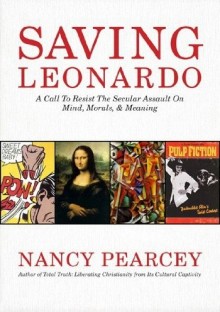Book Review: Saving Leonardo
 Wednesday, May 11, 2011 at 9:50PM
Wednesday, May 11, 2011 at 9:50PM  Saving Leonardo: A Call to Resist the Secular Assault on Mind, Morals, and Meaning
Saving Leonardo: A Call to Resist the Secular Assault on Mind, Morals, and MeaningA Call to Resist the Secular Assault on Mind, Morals, and Meaning by Nancy Pearcey.
I truly enjoyed reading Saving Leonardo, even though it took me a long time to make my way through the text. What’s more, as I mentioned earlier, this is a beautiful book, well-bound with glossy pages, large type and colourful pictures. Once I’ve written that much, however, I hit a bit of a book review roadblock.
Here’s the thing: I don’t know enough about the subject matter in the heart of this book to feel confident evaluating the contents. The arguments make sense and the information is well-documented, but still, I couldn’t shake the feeling the points might be a bit over-simplified. I know that in an introductory book the issues must be presented as simply as possible and perhaps that’s what Saving Leonardo is—an excellent introduction to a difficult subject. But I just don’t know enough to judge.
Now I’ve told you why I shouldn’t be reviewing this book, so if you stop reading right now, you won’t hurt my feelings. But if you’re still here, I’ll summarize the contents for you.
In Saving Leonardo, Nancy Pearcey evaluates secular worldviews on the basis of the fact/value dualism at their core, and shows that a Christian worldview successfully integrates the two. (If you’ve read Pearcey’s previous book, Total Truth, you have a head start by already knowing what the fact/value split is.) Her purpose is for the reader to “learn to recognize and resist secular ideas in science, philosophy, ethics, the arts and humanities.” She seeks to accomplish this by examining
the concepts and events, the thinkers and artists who led the way step by step in creating worldviews that undermine human dignity and liberty. And we will demonstrate that the only hope lies in a worldview that is rationally defensible, life affirming, and rooted in creation itself.
There are two parts to Saving Leonardo: Part 1, which describes how growing global secularization affects everyone everywhere, and Part 2 (the bulk and meat of the book), which following the advance of secularization in history, tracing the two threads of secularism—the Enlightenment thread, focusing on “the fact realm”; and the Romanticism thread, focusing on “the values realm”—especially as they influence the arts and culture.
Also by Nancy Pearcey:
The Soul of Science
How Shall We Then Live? (with Charles Colson and Harold Fickett)
The Right Questions (with Phillip E. Johnson)
Total Truth: Liberating Christianity from Its Cultural Captivity
Finally, there’s the epilogue. Here, Pearcey urges Christians to become involved in culture in a thoughtful way—to fulfill our cultural mandate.
Christian art should grow out of the robust confidence that nothing is unredeemable—that Jesus himself entered into the darkest levels of human experience and transformed them into sources of life and renewal. A full-orbed work of Christian art should include all three elements of the biblical worldview: creation, fall, redemption. It should allude to the beauty and dignity of the original creation. But it should also be transparently honest about the reality of sin and suffering. Finally, it should always give hints of redemption. No matter how degraded or corrupt a character may be, he or she should be portrayed with the dignity of being redeemable. Some ray of hope should penetrate the darkness.
The epilogue also contains a discussion of the use of ghost-writers in the Christian publishing business. This is one of my pet issues, because I know more ghost-writing is done than the most readers realize and it just isn’t right. I’m delighted, then, to see this addressed as the unethical practice it is. “When Christians accept such exploitive practices,” says Pearcey, “they are broadcasting to the world that they do not value creative or intellectual work, no matter what they may say.” (I’ll post a lengthier quote on the Christian ghostwriting business next week.)
Saving Leonardo, then, is pretty to look at and engaging to read. I plan to read more on the history and philosophy of artistic expression because I’ve become more curious about it. I know, too, that it’s important to learn to recognize and resist secularism and reading this book is, at the very least, a good place to start.


Reader Comments (1)
I just bought Total Truth yesterday (Kindle version) and have begun reading it. Am enjoying it very much -- the 8% I've read! She does have a way of making things easy to understand - which I appreciate. I remember trying to read Francis Schaefer and feeling lost. Not with her.